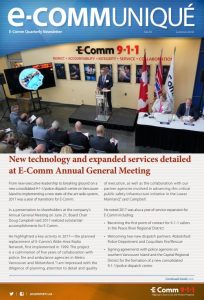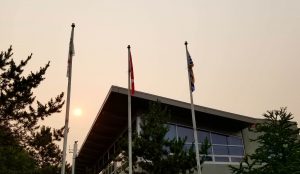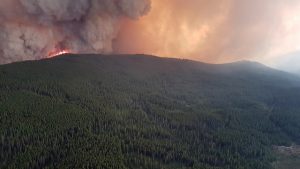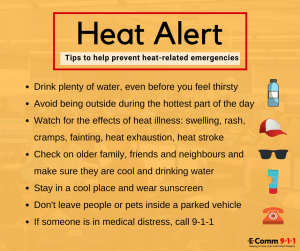We have published the summer 2018 edition of e-communiqué, our quarterly stakeholder newsletter.

The summer 2018 edition of e-communiqué includes:
- A recap of Annual General Meeting detailing technology and services accomplishments for 2017.
- An update on planning and construction of the new South Island 9-1-1/Police Dispatch Centre in Saanich. Scheduled to open in early 2019, the centre amalgamates 9-1-1 call-answer and police dispatch services for the Victoria, Saanich, Central Saanich and Oak Bay police departments and local RCMP detachments.
- E-Comm’s recent public education campaign – detailing the differences between emergency and non-emergency calls – has been recognized with two national Canadian advertising awards.
- Firefighters in the City of Langley and the Township of Langley are now using better radio equipment to help protect people and property, since joining the E-Comm Wide-Area Radio Network.
Visit our publications page for details.
 During periods of poor air quality, here are some tips from the Government of British Columbia:
During periods of poor air quality, here are some tips from the Government of British Columbia:
• Stop or reduce your activity level if breathing becomes difficult or you feel unwell.
• Stay cool and drink plenty of fluids.
• Carry any rescue medications with you at all times.
• Make sure that children and others who cannot care for themselves follow the same advice.
Find out more about the latest air quality advisories and smoky skies bulletins in B.C. on the B.C. Air Quality website.
Here is the current air quality index for B.C. communities from Environment Canada.
Here are answers to frequently asked questions about air quality.
 As B.C. continues to experience wildfires this summer, here are some resources to keep you informed:
As B.C. continues to experience wildfires this summer, here are some resources to keep you informed:
Remember to only call 9-1-1 if there’s an emergency. Don’t call 9-1-1 for general information or updates.
(Image from the Government of British Columbia)
 Wildfire smoke is impacting many parts of British Columbia.
Wildfire smoke is impacting many parts of British Columbia.
From Dease Lake in the Northwest to the Elk Valley in the southeast, to the Lower Mainland and Vancouver Island, Environment Canada air quality advisories and smoky skies bulletins cover most of B.C.
Metro Vancouver has issued an an air quality advisory for Metro Vancouver and the Fraser Valley because of high concentrations of fine particulate matter due to wildfire smoke from fires burning throughout the Pacific Northwest. More details in this air quality statement from Environment Canada. Read more about the Fraser Valley Regional District’s air quality advisory.
Here is some advice from Metro Vancouver:
Persons with chronic underlying medical conditions should postpone strenuous exercise until the advisory is lifted. Exposure is particularly a concern for infants, the elderly and those who have diabetes, and lung or heart disease. If you are experiencing symptoms such as chest discomfort, shortness of breath, coughing or wheezing, follow the advice of your health care provider. As we are in the summer season with warm temperatures, it is also important to stay cool and hydrated. Indoor spaces with air conditioning may offer relief from both heat and air pollution.
Additional information about air quality advisories and smoky skies bulletins is available from the Government of British Columbia.
 As B.C.’s summer heat continues, we have some reminders:
As B.C.’s summer heat continues, we have some reminders:
- If someone is in medical distress, call 9-1-1 for help.
- Call 8-1-1 for health questions on heat-related symptoms.
- Check with your city or municipality for information about community facilities with air conditioning, where you can escape the heat and cool off.
More information about heat-related illness from HealthLinkBC.



 During periods of poor air quality, here are some tips from the Government of British Columbia:
During periods of poor air quality, here are some tips from the Government of British Columbia: As B.C. continues to experience wildfires this summer, here are some resources to keep you informed:
As B.C. continues to experience wildfires this summer, here are some resources to keep you informed: Wildfire smoke is impacting many parts of British Columbia.
Wildfire smoke is impacting many parts of British Columbia. As B.C.’s summer heat continues, we have some reminders:
As B.C.’s summer heat continues, we have some reminders: